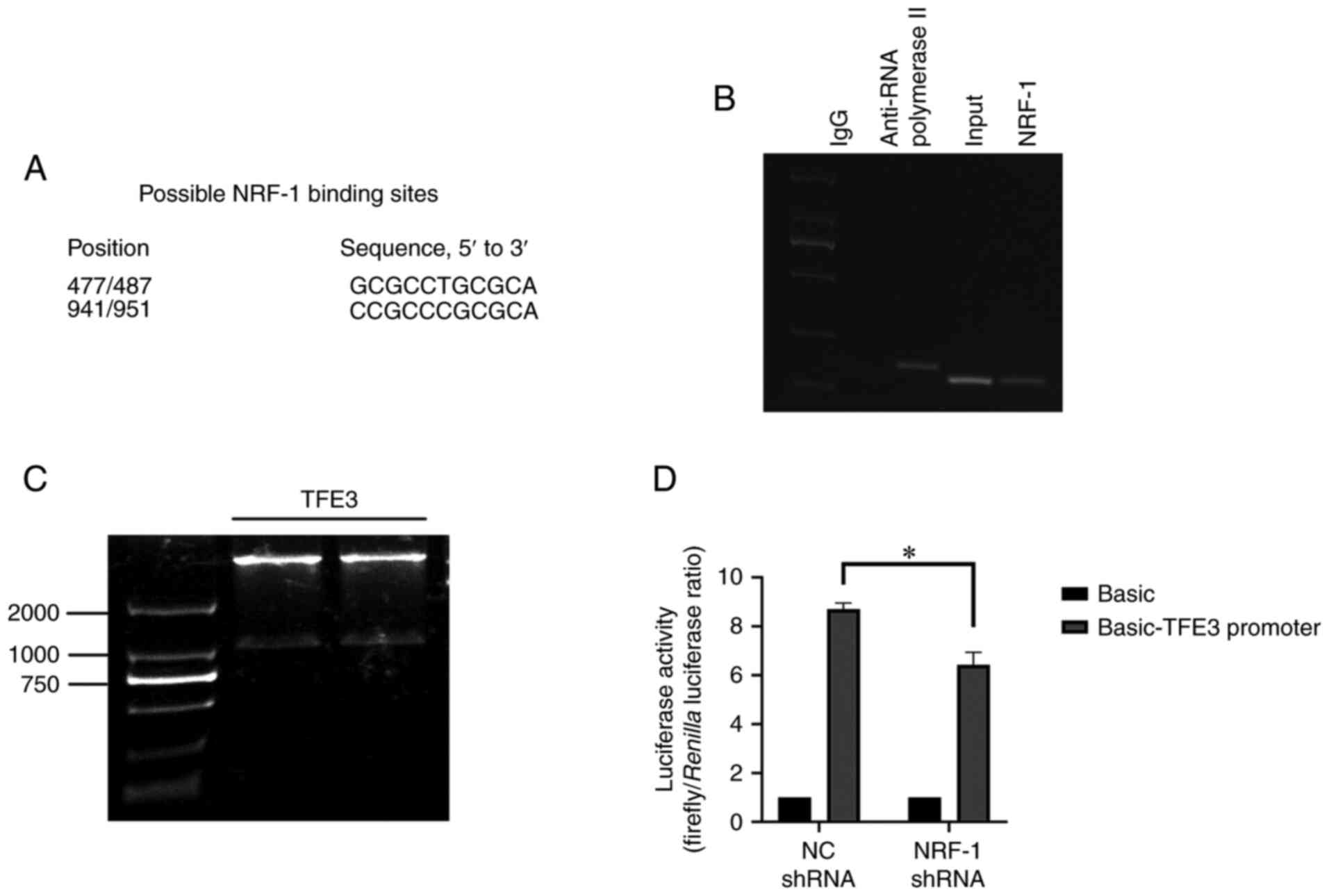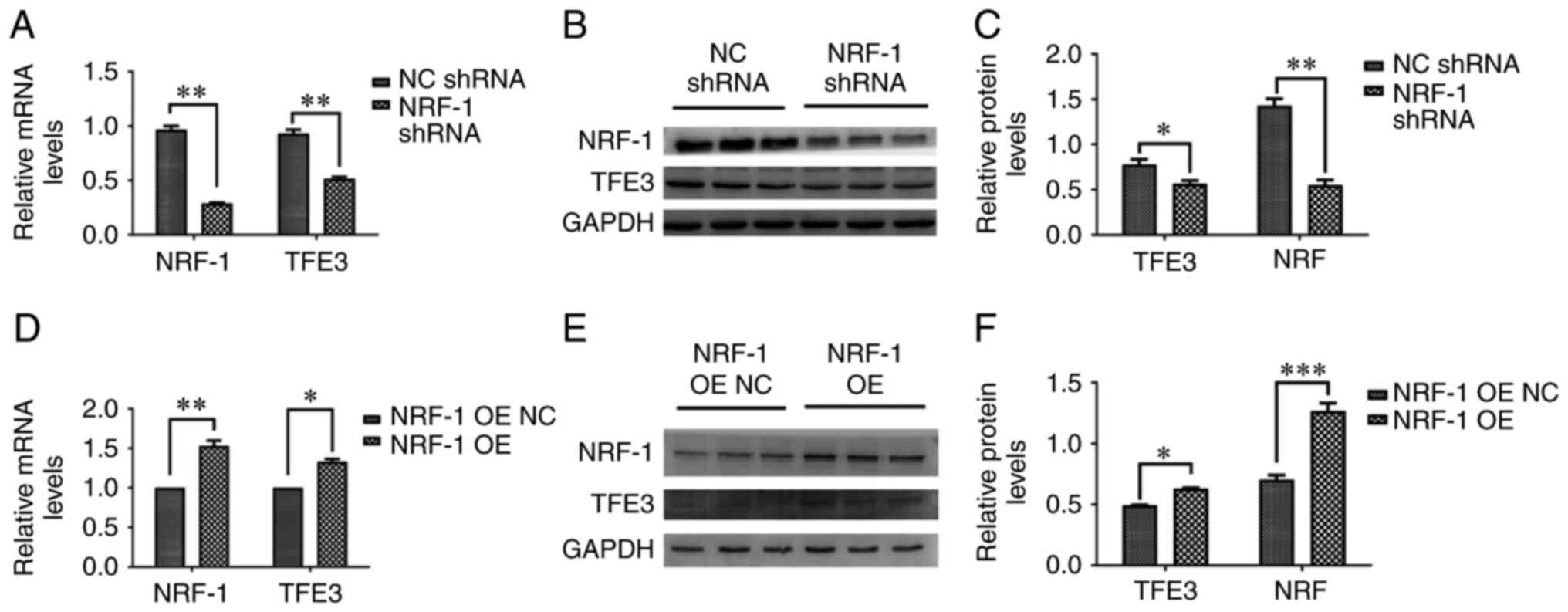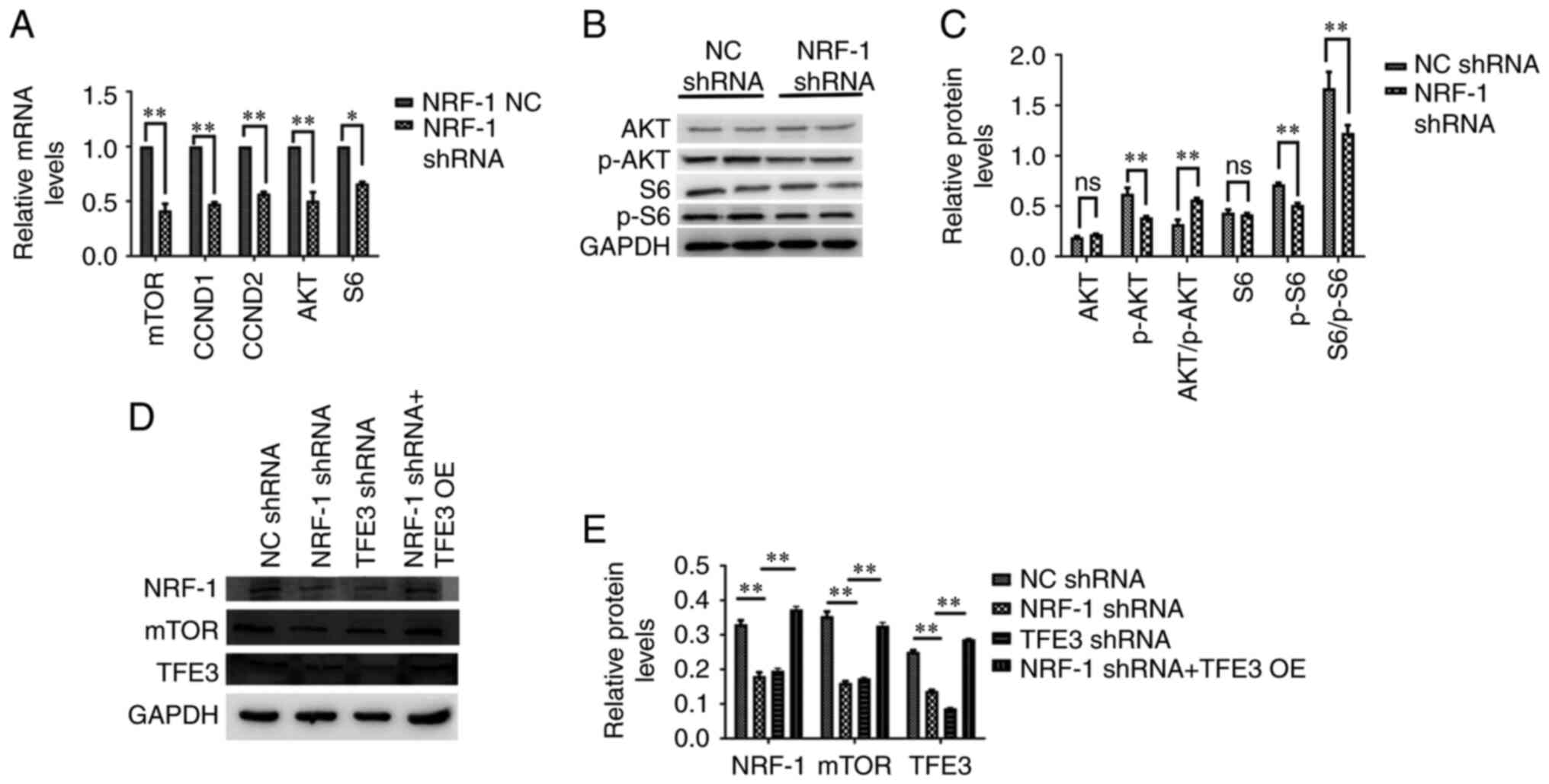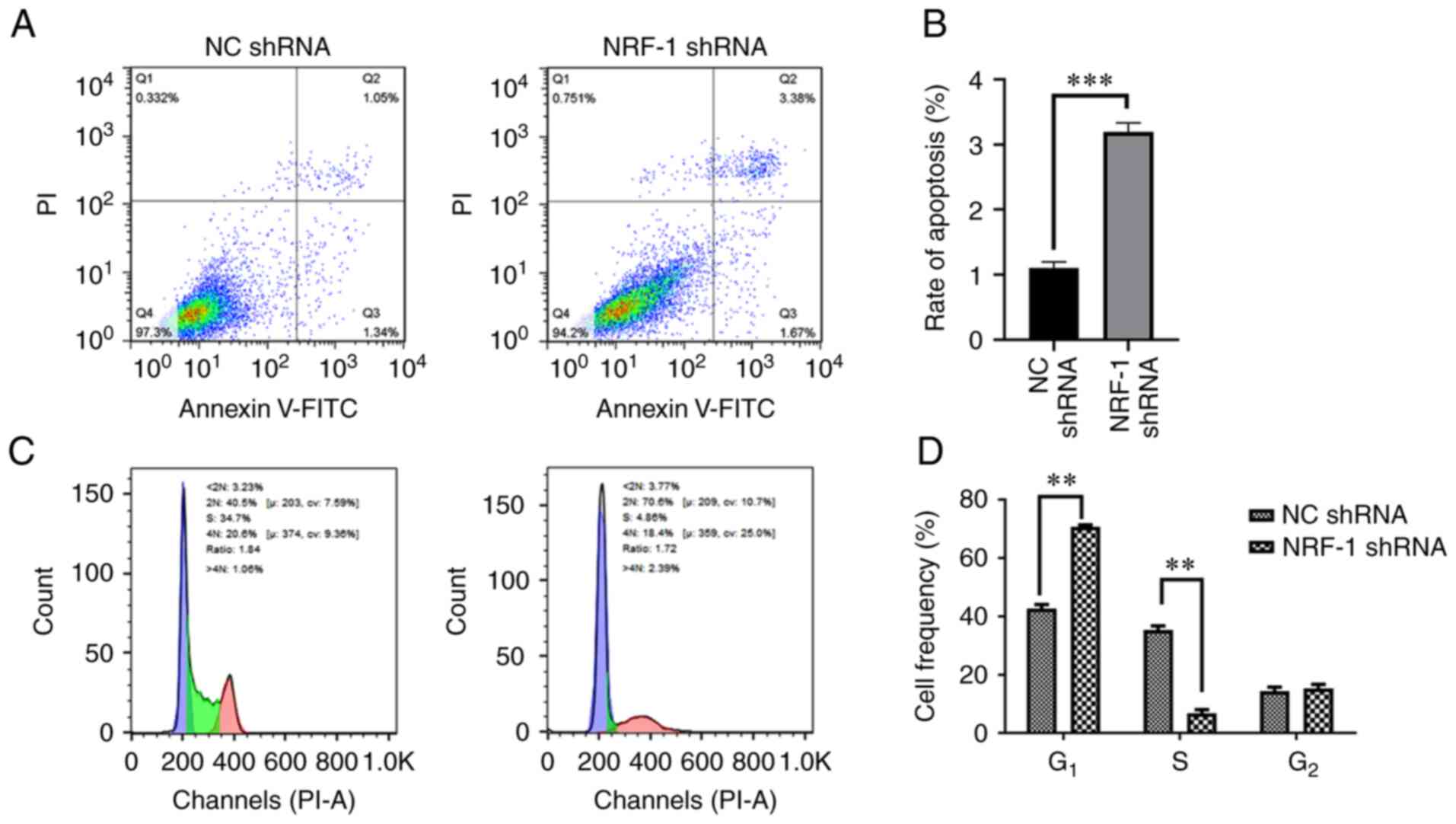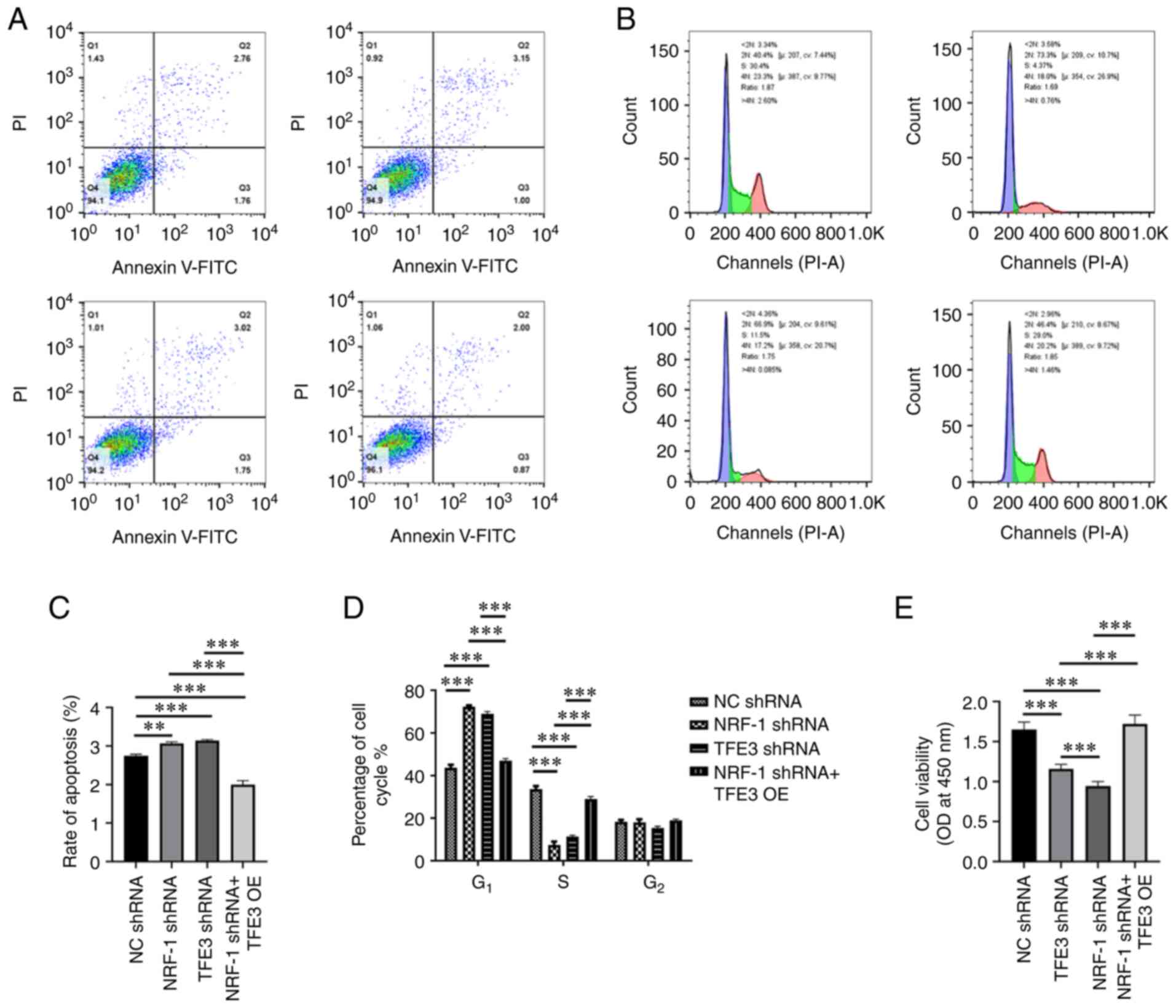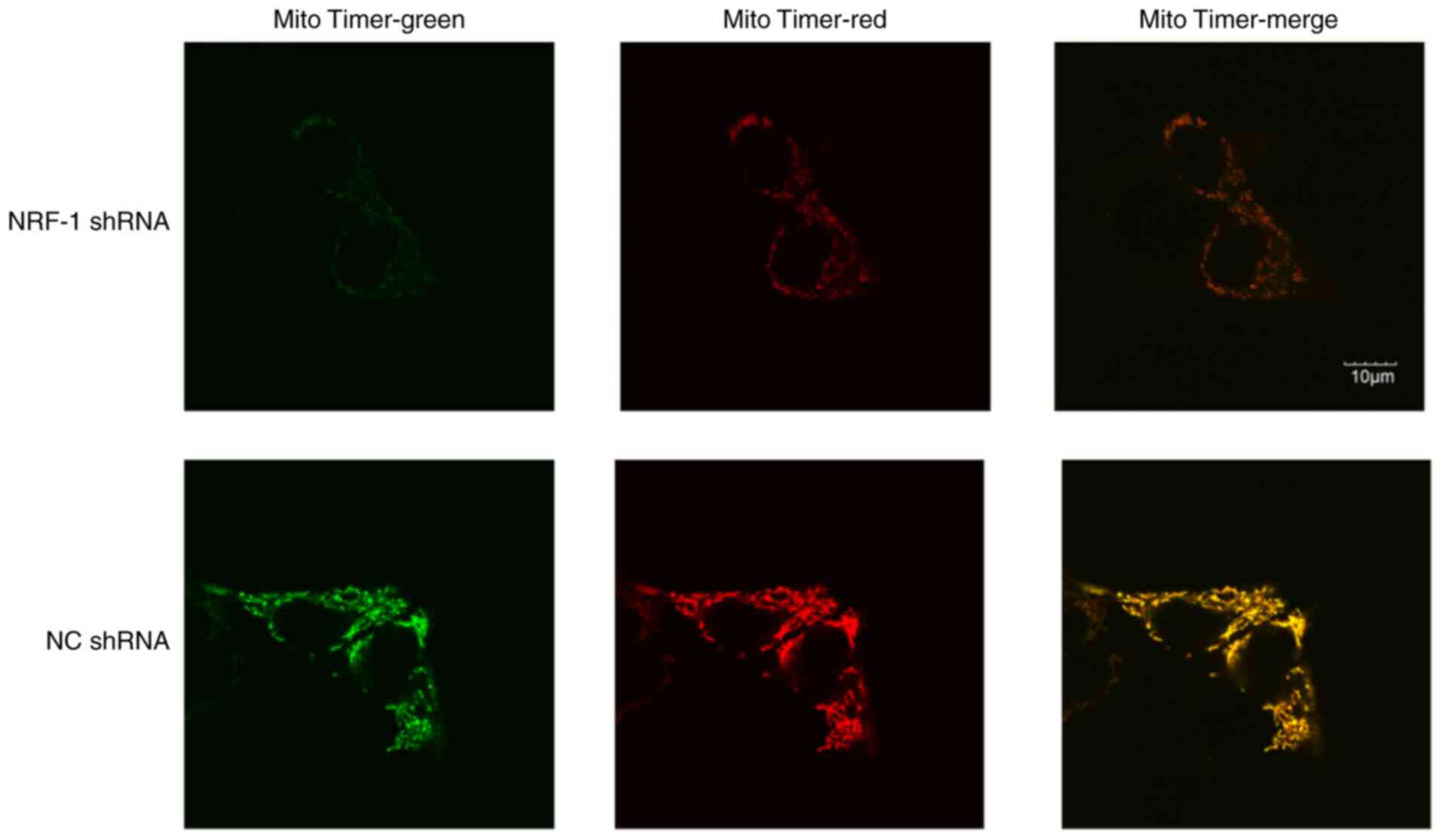|
1
|
Betschinger J, Nichols J, Dietmann S,
Corrin PD, Paddison PJ and Smith A: Exit from pluripotency is gated
by intracellular redistribution of the bHLH transcription factor
Tfe3. Cell. 153:335–347. 2013. View Article : Google Scholar : PubMed/NCBI
|
|
2
|
Fisher DE, Carr CS, Parent LA and Sharp
PA: TFEB has DNA-binding and oligomerization properties of a unique
helix-loop-helix/leucine-zipper family. Genes Dev. 5:2342–2352.
1991. View Article : Google Scholar : PubMed/NCBI
|
|
3
|
Hemesath TJ, Steingrímsson E, Mcgill G,
Hansen MJ, Vaught J, Hodgkinson CA, Arnheiter H, Copeland NG,
Jenkins NA and Fisher DE: microphthalmia, a critical factor in
melanocyte development, defines a discrete transcription factor
family. Genes Dev. 8:2770–2780. 1994. View Article : Google Scholar : PubMed/NCBI
|
|
4
|
Muhle-Goll C, Gibson T, Schuck P, Schubert
D, Nalis D, Nilges M and Pastore A: The dimerization stability of
the HLH-LZ transcription protein family is modulated by the leucine
zippers: A CD and NMR study of TFEB and c-Myc. Biochemistry.
33:11296–11306. 1994. View Article : Google Scholar : PubMed/NCBI
|
|
5
|
Vivian P, Ogmundsdóttir MH,
Bergsteinsdóttir K, Schepsky A, Phung B, Deineko V, Milewski M,
Steingrímsson E and Wilmanns M: Restricted leucine zipper
dimerization and specificity of DNA recognition of the melanocyte
master regulator MITF. Genes Dev. 26:2647–2658. 2012. View Article : Google Scholar : PubMed/NCBI
|
|
6
|
Raben N and Puertollano R: TFEB and TFE3:
Linking lysosomes to cellular adaptation to stress. Annu Rev Cell
Dev Biol. 32:255–278. 2016. View Article : Google Scholar : PubMed/NCBI
|
|
7
|
Xiong L, Chen X, Liu N, Wang Z, Miao B,
Gan W, Li D and Guo H: PRCC-TFE3 dual-fusion FISH assay: A new
method for identifying PRCC-TFE3 renal cell carcinoma in
paraffin-embedded tissue. PLoS One. 12:e01853372017. View Article : Google Scholar : PubMed/NCBI
|
|
8
|
Magers MJ, Udager AM and Mehra R: MiT
family translocation-associated renal cell carcinoma: A
contemporary update with emphasis on morphologic, immunophenotypic,
and molecular mimics. Arch Pathol Lab Med. 139:1224–1233. 2015.
View Article : Google Scholar : PubMed/NCBI
|
|
9
|
Martina JA, Diab HI, Brady OA and
Puertollano R: TFEB and TFE3 are novel components of the integrated
stress response. EMBO J. 35:479–495. 2016. View Article : Google Scholar : PubMed/NCBI
|
|
10
|
Pastore N, Vainshtein A, Klisch TJ, Armani
A, Huynh T, Herz NJ, Polishchuk EV, Sandri M and Ballabio A: TFE3
regulates whole-body energy metabolism in cooperation with TFEB.
EMBO Mol Med. 9:605–621. 2017. View Article : Google Scholar : PubMed/NCBI
|
|
11
|
Martina JA, Diab HI, Lishu L, Jeong-A L,
Patange S, Raben N and Puertollano R: The nutrient-responsive
transcription factor TFE3 promotes autophagy, lysosomal biogenesis,
and clearance of cellular debris. Sci Signal. 7:ra92014. View Article : Google Scholar : PubMed/NCBI
|
|
12
|
Ploper D, Taelman VF, Robert L, Perez BS,
Titz B, Chen HW, Graeber TG, von Euw E, Ribas A and De Robertis EM:
MITF drives endolysosomal biogenesis and potentiates Wnt signaling
in melanoma cells. Proc Natl Acad Sci USA. 112:E420–E429. 2015.
View Article : Google Scholar : PubMed/NCBI
|
|
13
|
Iwasaki H, Naka A, Iida KT, Nakagawa Y,
Shimano H, Matsuzaka T, Ishii KA, Kobayashi K, Takahashi A, Yatoh
S, et al: TFE3 regulates muscle metabolic gene expression,
increases glycogen stores, and enhances insulin sensitivity in
mice. Am J Physiol Endocrinol Metab. 302:E896–E902. 2012.
View Article : Google Scholar : PubMed/NCBI
|
|
14
|
Nakagawa Y, Shimano H, Yoshikawa T, Ide T,
Tamura M, Furusawa M, Yamamoto T, Inoue N, Matsuzaka T, Takahashi
A, et al: TFE3 transcriptionally activates hepatic IRS-2,
participates in insulin signaling and ameliorates diabetes. Nat
Med. 12:107–113. 2006. View
Article : Google Scholar : PubMed/NCBI
|
|
15
|
Nijman SMB, Hijmans EM, Messaoudi SE, van
Dongen MMW, Sardet C and Bernards R: A functional genetic screen
identifies TFE3 as a gene that confers resistance to the
anti-proliferative effects of the retinoblastoma protein and
transforming growth factor-beta. J Biol Chem. 281:21582–21587.
2006. View Article : Google Scholar : PubMed/NCBI
|
|
16
|
Muller-Hocker J, Babaryka G, Schmid I and
Jung A: Overexpression of cyclin D1, D3, and p21 in an infantile
renal carcinoma with Xp11.2 TFE3-gene fusion. Pathol Res Pract.
204:589–597. 2008. View Article : Google Scholar : PubMed/NCBI
|
|
17
|
Scarpulla RC: Nuclear control of
respiratory gene expression in mammalian cells. J Cell Biochem.
97:673–683. 2010. View Article : Google Scholar : PubMed/NCBI
|
|
18
|
Scarpulla RC: Nuclear control of
respiratory chain expression by nuclear respiratory factors and
PGC-1-related coactivator. Ann N Y Acad Sci. 1147:321–334. 2010.
View Article : Google Scholar : PubMed/NCBI
|
|
19
|
Virbasius CA, Virbasius JV and Scarpulla
RC: NRF-1, an activator involved in nuclear-mitochondrial
interactions, utilizes a new DNA-binding domain conserved in a
family of developmental regulators. Genes Dev. 7:24311993.
View Article : Google Scholar : PubMed/NCBI
|
|
20
|
Tang M, Yang Y, Yu J, Qiu J, Chen P, Wu Y,
Wang Q, Xu Z, Ge J, Yu K and Zhuang J: Tetramethylpyrazine in a
murine alkali-burn model blocks NFκB/NRF-1/CXCR4-signaling-induced
corneal neovascularization. Invest Ophthalmol Vis Sci.
59:2133–2141. 2018. View Article : Google Scholar : PubMed/NCBI
|
|
21
|
Satoh J, Kawana N and Yamamoto Y: Pathway
analysis of chip-seq-based NRF1 target genes suggests a logical
hypothesis of their involvement in the pathogenesis of
neurodegenerative diseases. Gene Regul Syst Bio. 7:139–152.
2013.PubMed/NCBI
|
|
22
|
Kimmelman AC and White E: Autophagy and
tumor metabolism. Cell Metab. 25:1037–1043. 2017. View Article : Google Scholar : PubMed/NCBI
|
|
23
|
Alam C, Hoque MT, Sangha V and Bendayan R:
Nuclear respiratory factor 1 (NRF-1) upregulates the expression and
function of reduced folate carrier (RFC) at the blood-brain
barrier. FASEB J. 34:10516–10530. 2020. View Article : Google Scholar : PubMed/NCBI
|
|
24
|
Solecki D, Bernhardt G, Lipp M and Wimmer
E: Identification of a nuclear respiratory Factor-1 binding site
within the core promoter of the human polio virus receptor/CD155
Gene. J Biol Chem. 275:12453–12462. 2000. View Article : Google Scholar : PubMed/NCBI
|
|
25
|
Livak KJ and Schmittgen TD: Analysis of
relative gene expression data using real-time quantitative PCR and
the 2(-Delta Delta C(T)) method. Methods. 25:402–408. 2001.
View Article : Google Scholar : PubMed/NCBI
|
|
26
|
Hernandez G, Thornton C, Stotland A, Lui
D, Sin J, Ramil J, Magee N, Andres A, Quarato G, Carreira RS, et
al: MitoTimer: A novel tool for monitoring mitochondrial turnover.
Autophagy. 9:1852–1861. 2013. View Article : Google Scholar : PubMed/NCBI
|
|
27
|
Williams JA, Zhao K, Jin S and Ding WX:
New methods for monitoring mitochondrial biogenesis and mitophagy
in vitro and in vivo. Exp Biol Med (Maywood). 242:781–787. 2017.
View Article : Google Scholar : PubMed/NCBI
|
|
28
|
Motzer RJ, Escudier B, Oudard S, Hutson
TE, Porta C, Bracarda S, Grünwald V, Thompson JA, Figlin RA,
Hollaender N, et al: Efficacy of everolimus in advanced renal cell
carcinoma: A double-blind, randomised, placebo-controlled phase III
trial. Lancet. 372:449–456. 2008. View Article : Google Scholar : PubMed/NCBI
|
|
29
|
Scarpulla RC: Metabolic control of
mitochondrial biogenesis through the PGC-1 family regulatory
network. Biochim Biophys Acta. 1813:1269–1278. 2011. View Article : Google Scholar : PubMed/NCBI
|
|
30
|
Jun-Ichi S, Natsuki K and Yoji Y: Pathway
analysis of ChIP-Seq-Based NRF1 target genes suggests a logical
hypothesis of their involvement in the pathogenesis of
neurodegenerative diseases. Gene Regul Syst Bio. 7:139–152.
2013.PubMed/NCBI
|
|
31
|
Evans MJ and Scarpulla RC: NRF-1: A
trans-activator of nuclear-encoded respiratory genes in animal
cells. Genes Dev. 4:1023–1034. 1990. View Article : Google Scholar : PubMed/NCBI
|
|
32
|
Taniguchi M, Nadanaka S, Tanakura S,
Sawaguchi S, Midori S, Kawai Y, Yamaguchi S, Shimada Y, Nakamura Y,
Matsumura Y, et al: TFE3 is a bHLH-ZIP-type transcription factor
that regulates the mammalian Golgi stress response. Cell Struct
Funct. 40:13–30. 2015. View Article : Google Scholar : PubMed/NCBI
|
|
33
|
Zanocco-Marani T, Vignudelli T, Parenti S,
Gemelli C, Condorelli F, Martello A, Selmi T, Grande A and Ferrari
S: TFE3 transcription factor regulates the expression of MAFB
during macrophage differentiation. Exp Cell Res. 315:1798–1808.
2009. View Article : Google Scholar : PubMed/NCBI
|
|
34
|
Zanocco-Marani T, Vignudelli T, Gemelli C,
Pirondi S, Testa A, Montanari M, Parenti S, Tenedini E, Grande A
and Ferrari S: Tfe3 expression is closely associated to macrophage
terminal differentiation of human hematopoietic myeloid precursors.
Exp Cell Res. 312:4079–4089. 2006. View Article : Google Scholar : PubMed/NCBI
|
|
35
|
Shi CS, Shenderov K, Huang NN, Kabat J,
Abu-Asab M, Fitzgerald KA, Sher A and Kehrl JH: Activation of
autophagy by inflammatory signals limits IL-1β production by
targeting ubiquitinated inflammasomes for destruction. Nat Immunol.
13:255–263. 2012. View Article : Google Scholar : PubMed/NCBI
|
|
36
|
Murugan AK: mTOR: Role in cancer,
metastasis and drug resistance. Semin Cancer Biol. 59:92–111. 2019.
View Article : Google Scholar : PubMed/NCBI
|
|
37
|
Saxton RA and Sabatini DM: mTOR signaling
in growth, metabolism, and disease. Cell. 168:960–976. 2017.
View Article : Google Scholar : PubMed/NCBI
|
|
38
|
Zhang Y, Kwok-Shing Ng P, Kucherlapati M,
Chen F, Liu Y, Tsang YH, de Velasco G, Jeong KJ, Akbani R,
Hadjipanayis A, et al: A Pan-cancer proteogenomic Atlas of
PI3K/AKT/mTOR pathway alterations. Cancer Cell. 31:820–832.e3.
2017. View Article : Google Scholar : PubMed/NCBI
|
|
39
|
Argani P, Hicks J, De Marzo AM, Albadine
R, Illei PB, Ladanyi M, Reuter VE and Netto GJ: Xp11 translocation
renal cell carcinoma (RCC): Extended immunohistochemical profile
emphasizing novel RCC markers. Am J Surg Pathol. 34:1295–1303.
2010. View Article : Google Scholar : PubMed/NCBI
|
|
40
|
Li J, Wada S, Weaver LK, Biswas C, Behrens
EM and Arany Z: Myeloid Folliculin balances mTOR activation to
maintain innate immunity homeostasis. JCI Insight.
5:e1269392019.PubMed/NCBI
|
|
41
|
Damayanti NP, Budka JA, Khella HWZ, Ferris
MW, Ku SY, Kauffman E, Wood AC, Ahmed K, Chintala VN,
Adelaiye-Ogala R, et al: Therapeutic targeting of
TFE3/IRS-1/PI3K/mTOR axis in translocation renal cell carcinoma.
Clin Cancer Res. 24:5977–5989. 2018. View Article : Google Scholar : PubMed/NCBI
|
|
42
|
Kauffman EC, Ricketts CJ, Rais-Bahrami S,
Yang Y, Merino MJ, Bottaro DP, Srinivasan R and Linehan WM:
Molecular genetics and cellular features of TFE3 and TFEB fusion
kidney cancers. Nat Rev Urol. 11:465–475. 2014. View Article : Google Scholar : PubMed/NCBI
|
|
43
|
Wang D, Zhang J, Lu Y, Luo Q and Zhu L:
Nuclear respiratory factor-1 (NRF-1) regulated hypoxia-inducible
factor-1α (HIF-1α) under hypoxia in HEK293T. IUBMB Life.
68:748–755. 2016. View Article : Google Scholar : PubMed/NCBI
|
|
44
|
Li X, Wenes M, Romero P, Huang CC, Fendt
SM and Ho PC: Navigating metabolic pathways to enhance antitumour
immunity and immunotherapy. Nat Rev Clin Oncol. 16:425–441. 2019.
View Article : Google Scholar : PubMed/NCBI
|















